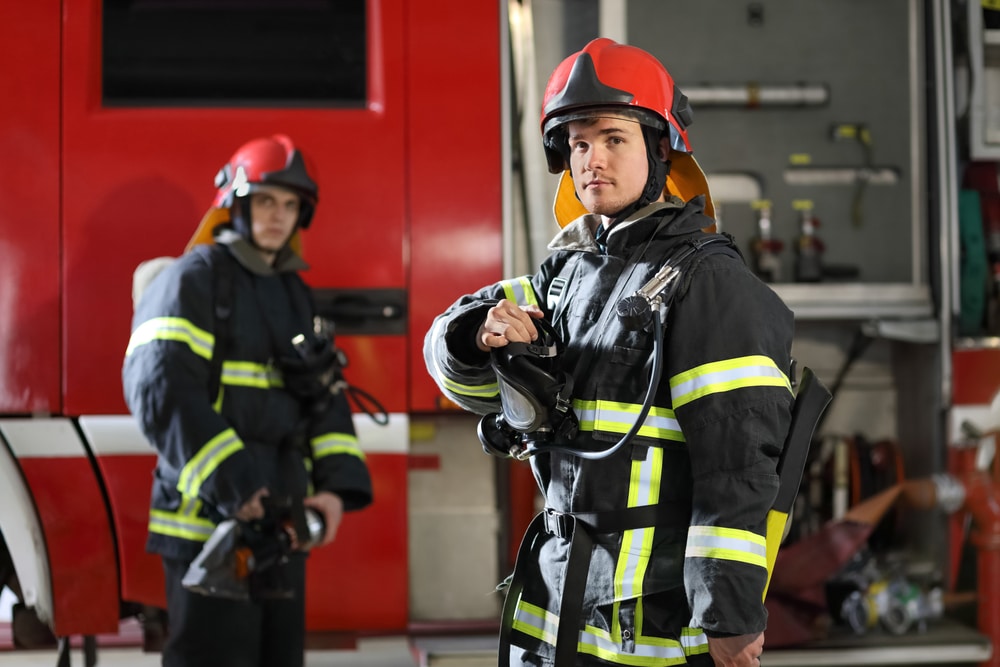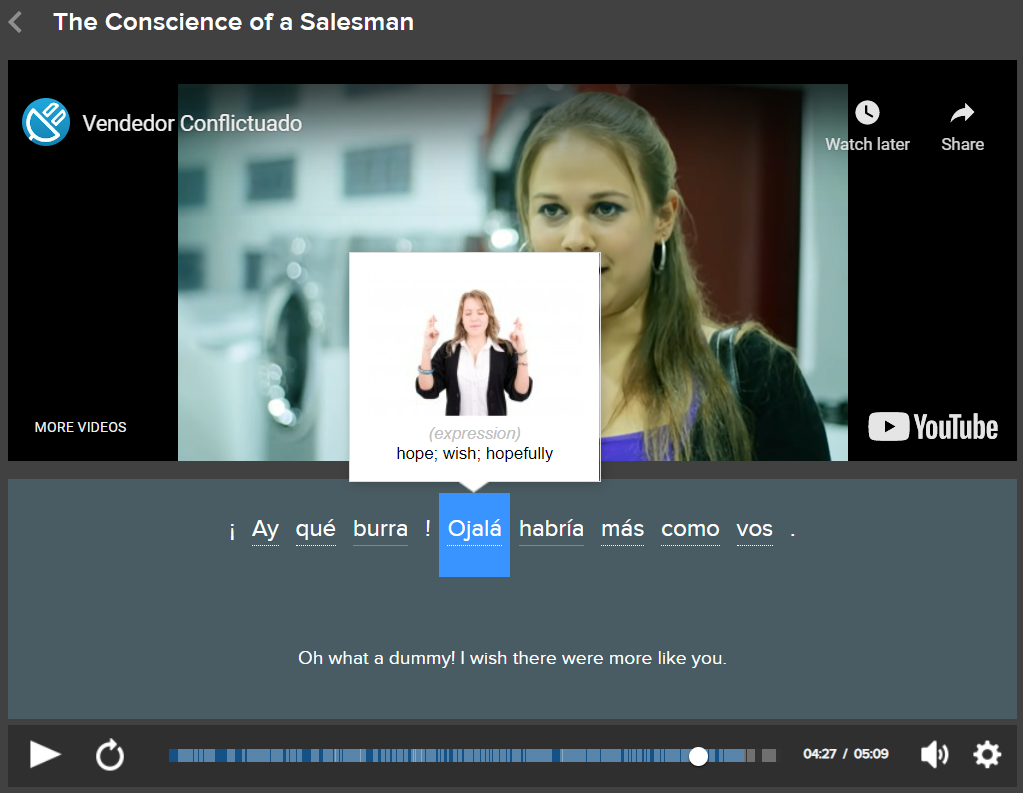![35 Spanish Choose-up Traces to Break the Ice [With Audio] 35 Spanish Choose-up Traces to Break the Ice [With Audio]](https://www.fluentu.com/blog/spanish/wp-content/uploads/sites/2/2022/09/pick-up-lines-in-spanish.jpg)
[ad_1]

Regardless that a corny piropo
(pick-up line) would possibly make you need to roll your eyes, you must admit they’re enjoyable to be taught and share!
Choose-up traces in Spanish make use of intelligent performs on phrases and evoke photographs each poetic and mundane.
Plus, they will train you numerous about Spanish grammar and introduce you to new vocabulary.
Learn on to find among the finest Spanish pick-up traces, and be taught some Spanish whereas having a superb chortle!
Contents
- 1. Si besarte fuera pecado, caminaría feliz por el infierno.
- 2. Quisiera ser joyero para poder apreciar todos los días un diamante como tú.
- 3. Si Cristóbal Colón te viera, diría: ¡Santa María, qué Pinta tiene esta Niña!
- 4. Si el agua fuese belleza, tú serías el océano entero.
- 5. No necesito que la noche caiga para poder ver las estrellas.
- 6. Hasta el sol siente celos de la forma en que brillas.
- 7. Tú eres la estrella que guía mi corazón.
- 8. Ojalá la mitad de las estrellas brillaran tanto como tus ojos.
- 9. ¿Qué hace una estrella volando tan bajo?
- 10. Me gustaría ser lente de contacto para que no pudieras sacarme tu mirada.
- 11. Diría que Dios te bendiga, pero parece que ya lo hizo.
- 12. Ojalá fueras bombero para apagar el fuego de mi deseo.
- 13. ¿Te dolió cuando te caíste del cielo?
- 14. Si yo fuera azafata, te llevaría en mi avión, pero como no lo soy, te llevo en mi corazón.
- 15. Debo estar muerto porque estoy viendo angelitos.
- 16. Espero que te guste la fruta, porque soy tu media naranja.
- 17. Hay una fiesta en mi corazón y tú estás invitado.
- 18. ¿Me harías el honor de un baile?
- 19. ¿Hace calor aquí o eres tú?
- 20. Tu papá debe ser pirata, porque eres un tesoro.
- 21. Tus labios parecen solitarios, ¿les gustaría conocerse con los míos?
- 22. ¿Perdone, está ocupado este asiento?
- 23. Si amarte fuera trabajo, no existiría el desempleo.
- 24. Si la belleza fuese delito, yo te hubiera sentenciado a cadena perpetua.
- 25. ¿Dónde has estado toda mi vida?
- 26. ¿Te has perdido? Porque el cielo está bien lejos de aquí.
- 27. Perdí mi número, ¿me das el tuyo?
- 28. Si tus ojos fueran el cielo y tu boca el mar, me gustaría ser el horizonte para poderte besar.
- 29. ¿Te llamas Google? Porque tienes todo lo que busco.
- 30. No creía en el amor a primera vista hasta que entraste aquí.
- 31. Pasas tanto tiempo en mi mente que debería cobrarte la renta.
- 32. ¿Me puedes decir que hora es?
- 33. Dios debe de estar distraído porque están cayendo ángeles del cielo.
- 34. ¿Podrías prestarme un diccionario? Es que al verte me he quedado sin palabras.
- 35. Qué poco azul llevas… para el cielo que eres.
- Utilizing the Previous Subjunctive in Spanish Choose-up Traces
- Find out how to Be taught Extra Choose-up Traces in Spanish
Obtain:
This weblog submit is on the market as a handy and transportable PDF that you simply
can take anyplace.
Click on right here to get a duplicate. (Obtain)
(If kissing you had been a sin, I’d fortunately stroll by way of hell.)
Word the construction of this sentence: It begins with the phrase si (if) and comprises a previous subjunctive verb in addition to a verb in the conditional tense. A number of piropos take this construction, so that you’ll need to be taught it properly!
Utilizing the conditional verb caminaría (I’d stroll) is technically right, however in colloquial Spanish you may additionally use the imperfect caminaba. Since piropos are by definition colloquial Spanish, you need to count on to listen to these variations fairly a bit.

(I’d prefer to be a jeweler to have the ability to admire a diamond such as you daily.)
Si clauses are one use of the previous subjunctive, however they’re removed from the one use. With this pick-up line, we transfer away from si clauses, which is why you received’t see any verbs conjugated within the conditional tense.
Quisiera, from the verb querer (to need) is a particular verb previously subjunctive. It’s a really well mannered or elegant solution to say “I’d like,” not a lot totally different from me gustaría (I’d like).
(If Christopher Columbus noticed you, he’d say, “Saint Mary, that lady appears unbelievable!”)
This piropo is a superb instance of how sure issues simply don’t translate between English and Spanish. Cristóbal Colón is Christopher Columbus’s identify in Spanish, and the three ships that Columbus sailed to America had been the Niña, the Pinta and the Santa María.
Santa María (Saint Mary) can be used as an interjection in Spanish, like “Oh my God!” and tener pinta is a colloquial approach to say that somebody (or one thing) appears good. That is one other si clause, this time with the previous subjunctive of the verb ver (to see), viera.

(If water had been magnificence, you’d be the entire ocean.)
Right here now we have one other si clause, utilizing the verb ser (to be) in each the previous subjunctive and conditional varieties.
Word that this pick-up line makes use of the verb fuese as an alternative of fuera, however these two verbs are fully interchangeable! Any time you see a verb previously subjunctive, remember the fact that it has an equal type.
(I don’t want it to be nighttime to have the ability to see the celebrities.)
This line makes use of the current subjunctive type of caller (to fall) to consult with the evening falling, or on this case not needing to fall to see stars, when the particular person on the receiving finish of the pick-up line is current.

(Even the solar is jealous of the way in which you shine.)
The adjective “jealous” is celoso/a in Spanish, however it’s also possible to say tener/sentir celos to imply “to be jealous” or “to really feel jealousy.”
(You’re the star that guides my coronary heart.)
Unsurprisingly, many piropos contain stars. This one would make extra sense between a pair fairly than strangers.

(If solely half of the celebrities within the sky shined as brightly as your eyes.)
The phrase ojalá has its roots within the Arabic phrase Allah (God) and is all the time adopted by the subjunctive previous or current. Whenever you observe it with a gift tense verb, it means one thing like “hopefully” or “God prepared”:
¡Ojalá haga buen clima!
(I hope the climate is sweet!)
Nonetheless, with the previous subjunctive, ojalá expresses an unimaginable want and is just like the English “If solely…” or “I want…” Due to this, ojalá plus the previous subjunctive is ideal for romantic proclamations, such because the one above!
(What’s a star doing flying so low?)
One other star-themed line, this one comes within the type of a query and is simply as tacky because the earlier one.

(I’d prefer to be a contact lens so that you couldn’t take your eyes off me.)
Some piropos evoke stunning photographs of the ocean, the celebrities, the moon… and others simply speak about contact lenses! Choose-up traces in Spanish, like in English, don’t must be super-serious and passionate. Among the most entertaining ones are foolish performs on phrases just like the one above.
Para que (in order that) is one other set off phrase that ought to let you realize you’ll possible want to make use of a subjunctive verb. On this case, because you’re speaking a few want or unlikely occasion, use the previous subjunctive.
(I’d say “God Bless You,” however it appears like he already did.)
When somebody sneezes, Spanish audio system usually say “¡Salud!” However to say “Bless you,” you’ll say “Que Dios te bendiga” (actually: Might God bless you). So this pick-up line actually solely is sensible after somebody sneezes.
We are able to see the subjunctive in motion on this sentence, with the set off phrase que adopted by bendiga (which comes from bendecir, that means “to bless.”)

(I want you had been a firefighter to place out the fireplace of my want.)
Right here’s one other instance of ojalá plus the previous subjunctive (fueras).
(Did it harm whenever you fell from heaven?)
You’ve in all probability heard this basic pick-up line in English, and now you may add the Spanish model to your arsenal!
Right here we see the verb doler (to harm/to be painful)—which is used equally to the verb gustar—in motion with the oblique object pronoun te (you).

(If I had been a flight attendant, I’d carry you in my airplane, however since I’m not, I’ll carry you in my coronary heart.)
This cute rhyming pick-up line consists of a compound sentence. The primary half is a si clause like those we’ve seen to this point, together with the previous subjunctive verb fuera from ser (to be) and the conditional verb llevaría from llevar (to take).
The second half of the pick-up line is written within the indicative, with two current tense indicative verbs: soy (I’m) and llevo (I take).
As a result of the primary half of the sentence describes a dream or a hypothetical (If I had been a flight attendant…), it requires subjunctive and conditional tenses. The second half of the sentence offers with actuality (I’m not a flight attendant) so you may follow the indicative.
(I have to be useless as a result of I’m seeing angels.)
Word that as a result of muerto (useless) is an adjective, in case you’re feminine you’ll say muerta as an alternative.

(I hope you want fruit as a result of I’m your half-orange.)
As unusual as this one might sound, it does truly make sense within the Spanish-speaking world. In Spanish, it’s frequent to make use of the phrase media naranja (actually, half-orange) to imply “soulmate” or “higher half.”
(There’s a celebration in my coronary heart and also you’re invited.)
Keep in mind to alter the phrase invitado to invitada in case you’re addressing a girl.

(Would you do me the dignity of a dance?)
Right here we make use of the conditional tense with harías (you’ll/would you). In case you favor to simplify issues, you may additionally use the conditional tense to say: ¿Bailarías conmigo?
(Would you dance with me?)
(Is it scorching in right here or is it simply you?)
That is one other good alternative to see how Spanish isn’t all the time translated actually into English. You would possibly need to say “o es tú?” to imply “or is it you?”, however we by no means mix the verb type es (it’s/is it) with tú (you).

(Your dad have to be a pirate since you’re a treasure.)
In English we use the indefinite article “a” within the phrase “have to be a pirate,” however in Spanish, it suffices to say “debe ser pirata” (actually, “have to be pirate”).
It is because we don’t want to make use of an indefinite article (or any article in any respect) when speaking about issues like your occupation, nationality, or faith—on this case, being a pirate counts as a occupation!
(Your lips look lonely, would they like to fulfill mine?)
This can be a “massive threat, massive reward” kind pick-up line—it has the potential to fail spectacularly, however who is aware of, perhaps it’s well worth the threat. Simply be sure to’re getting optimistic, romantic indicators from them first… or reserve it for making your companion chortle.

(Excuse me, is that this seat taken?)
This pick-up line is each low-risk—in the event that they aren’t into it, you may faux you actually wanted the seat—and well mannered. Word the usage of perdone, which is used with the formal usted.
In case you’re flirting with a stranger and aren’t positive whether or not to make use of tú or usted, play it protected and go together with usted to indicate some respect.
(If loving you was a job, unemployment wouldn’t exist.)
This cheeky phrase is one other instance of a now-familiar construction: si + [verb in the past subjunctive tense] + [verb in the conditional tense]. Whereas this construction is frequent with piropos, it’s additionally a useful construction to know for on a regular basis Spanish.

(If magnificence was a criminal offense, I’d sentence you to life in jail.)
Listed below are two extra verbs within the imperfect subjunctive: fuese and hubiera. We even have a phrase that is perhaps new to your vocabulary: cadena perpetua, which suggests “life imprisonment” or “life in jail.”
(The place have you ever been all my life?)
This basic line contains an instance of the current excellent tense.

(Are you misplaced? As a result of heaven is a great distance from right here.)
Noticing a sure theme right here? This gem expands on our angel and heaven-themed pick-up traces, and offers us one other instance of the current excellent tense.
(I misplaced my quantity, can I’ve yours?)
Whereas this one doesn’t make a lot literal sense, it’s a flirtier (albeit cheesier) solution to ask for somebody’s quantity.

(In case your eyes had been the sky and your mouth had been the ocean, I’d prefer to be the horizon to have the ability to kiss you.)
Right here now we have one other nice instance of a si clause utilizing the verbs ser (to be) and gustar (to love, to please). However this pick-up line touches on one other difficult grammar challenge as properly: the distinction between por and para.
(Is your identify Google? As a result of you’ve got every part I’m in search of.)
This is perhaps one of many cheesiest traces on the record, however it’s positive to get a smile out of them!

(I didn’t consider in love at first sight till you walked in.)
This can be a good instance of the imperfect and preterite tenses used collectively in a single sentence.
(You spend a lot time in my thoughts that I ought to cost you hire.)
Do not forget that debe means “should” whereas debería means “ought to.”

(Are you able to inform me what time it’s?)
Whereas it’s not very artistic or poetic, this (or some variation) is the pick-up line you’re in all probability most definitely to listen to in Spanish. It’s a typical solution to attempt to strike up a dialog with a stranger.
(God have to be distracted as a result of angels are falling from heaven.)
Right here’s an instance of debe (should) as referred to earlier.
34. ¿Podrías prestarme un diccionario? Es que al verte me he quedado sin palabras.

(Might you lend me a dictionary? It’s simply that seeing you has left me with out phrases.)
Utilizing al adopted by an infinitive verb often means one thing like “upon,” “on” or “when” adopted by the gerund (verb ending in “-ing”) in English. So the top of this line actually interprets to “upon seeing you I’ve been left with out phrases.”
We’d usually translate sin palabras to “speechless,” however “with out phrases” makes extra sense for this pick-up line.
(What little blue you’re sporting… for the sky that you’re.)
This pick-up line makes extra sense if you realize that cielo means not solely “sky” but in addition “heaven,” and can also be a time period of endearment that one would possibly name a big different.
Listed below are a number of extra Spanish pick-up traces so as to add to your repertoire:
Utilizing the Previous Subjunctive in Spanish Choose-up Traces
You might have seen that a lot of our Spanish pick-up traces characteristic the notorious previous subjunctive to precise needs, unfulfilled needs or unlikely occurrences.
Let’s assessment the conjugation of the previous subjunctive utilizing the verb hablar (to speak). Begin with the third-person plural type of the preterite: hablaron. Subsequent, chop off the ultimate -ron and add one of many two accepted verb endings.
| yo | -ra | -se |
| tú | -ras | -ses |
| él/ella/usted | -ra | -se |
| ellos/ellas/ustedes | -ran | -sen |
| vosotros | -rais | -seis |
| nosotros | -ramos | -semos |
For instance:
Él quería que hablaseis con la profesora.
(He needed you to speak to the professor.)
Ojalá hablara español.
(If solely I spoke Spanish.)
Si hablaras inglés, ¿te irías a vivir a Irlanda?
(In case you spoke English, would you go reside in Eire?)
These verb endings don’t change, no matter whether or not the verbs finish in -ar, -er or -ir. Simply do not forget that any irregular verbs previously tense indicative keep their irregular stems previously subjunctive, resembling fuera from ser (to be) or quisiera from querer (to need).
Find out how to Be taught Extra Choose-up Traces in Spanish
Spanish piropos continuously make use of puns and performs on phrases that may train you numerous in regards to the language and tradition. They’re additionally an effective way to hone in on difficult grammar factors just like the previous subjunctive.
To be taught extra Spanish pick-up traces, hear for them whereas watching Spanish motion pictures or TV exhibits to see how they’re utilized in context. Actuality TV courting exhibits particularly are filled with tacky pick-up traces and different fascinating Spanish vocab, which is able to aid you follow every part we’ve realized right here at the moment (and extra).
Yow will discover loads of helpful Spanish movies on YouTube and language studying packages like FluentU—which incorporates tons of of genuine movies, from clips of telenovelas (cleaning soap operas) to music movies and way more.
Every video on the platform comes with interactive subtitles that allow you to hover over a time period to search out its definition, pronunciation and use in several contexts.
You may add phrases you don’t know to multimedia flashcard decks and take personalised quizzes to trace your progress. Plus, it’s simple to be taught on the go together with the FluentU iOS and Android apps.
Spanish pick-up traces are a ton of enjoyable, whether or not you’re flirting together with your crush or just swapping humorous phrases with your pals.
To not point out, they’re nice grammar and vocabulary follow!
Which of those pick-up traces will you utilize first?
Obtain:
This weblog submit is on the market as a handy and transportable PDF that you simply
can take anyplace.
Click on right here to get a duplicate. (Obtain)
[ad_2]
